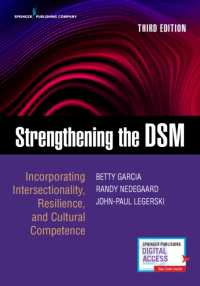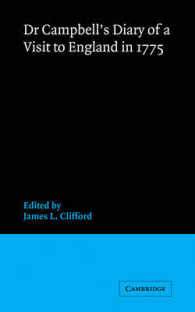Full Description
In the last two decades, the philosophy of criminal law has undergone a vibrant revival in Canada. The adoption of the Charter of Rights and Freedoms has given the Supreme Court of Canada unprecedented latitude to engage with principles of legal, moral, and political philosophy when elaborating its criminal law jurisprudence. Canadian scholars have followed suit by paying increased attention to the philosophical foundations of domestic criminal law. Because of Canada's leadership in international criminal law, both at the level of the International Criminal Court and of specific war crimes tribunals, they have also begun to turn their attention to international criminal law per se. This collection seeks to bring all these Canadian voices together for the first time, and evidence the fact that criminal law theory is no longer to be associated exclusively with the older British, German and American traditions. The topics covered include questions of philosophical methodology, the legitimate scope of domestic and international criminalization, rationales for criminal law defences in both domestic and international law, the philosophical underpinnings of specific crimes and forms of joint responsibility, as well as the theorization of criminal procedure and evidence law.
ENDORSEMENTS
"In continental Europe, academic commentary on the criminal law has long manifested large philosophical ambitions. Less so in common-law countries, where the dominance of jury trial and the piecemeal development of case-law, together with the famously robust attitudes of common lawyers, have militated against detailed philosophical engagement with doctrine. Over the last 20 years or so, however, new generations of philosophically-literate lawyers and legally-informed philosophers have overcome the historic resistance. Nowhere more so, it seems, than in Canada, where the common law and civilian traditions meet. In 'Rethinking Criminal Law Theory', François Tanguay-Renaud and James Stribopoulos have joined with 14 talented Canadian colleagues to showcase the tremendous breadth and depth of their contemporary national contribution to the subject. Ranging across topics as diverse as emergency, obscenity, and insanity, these essays - without exception insightful and penetrating -set a high standard for the rest of us to aspire to.''
John Gardner, University of Oxford
"'Rethinking Criminal Law Theory' is an excellent collection of essays demonstrating the vigour, creativity and range of Canadian criminal justice scholarship. It covers a wide range of problems and issues both in the domestic and the international context. Core questions are examined in depth and new questions are brought to the fore. I recommend it very highly to criminal lawyers and philosophers of the criminal law."
Professor Victor Tadros, University of Warwick
"'Rethinking Criminal Law Theory 'is packed with outstanding contributions from criminal law theorists who are among the best not only in Canada, but in the whole English-speaking world. Broad and deep in its coverage, the collection offers fresh approaches to a wide range of cutting-edge issues in the field. It provides a resource readers will come back to repeatedly."
Stuart Green, Professor of Law and Justice Nathan L Jacobs Scholar, Rutgers University
Contents
PART I
Rethinking the Philosophical Foundations of Substantive Domestic Criminal Law
A. The Legitimate Scope of Criminal Law and the Methodology of Criminal Law Theory
1. Two Conceptions of Equality before the (Criminal) Law
Malcolm Thorburn
2. Individual Emergencies and the Rule of Criminal Law
François Tanguay-Renaud
3. The Wrong, the Bad and the Wayward: Liberalism's Mala in Se
Alan Brudner
4. Obscenity without Borders
Leslie Green
B. New Perspectives on Exculpation
5. Understanding the Voluntary Act Principle
Andrew Botterell
6. Mental Disorder and the Instability of Blame in Criminal Law
Benjamin L Berger
7. Responsibility, Self-respect and the Ethics of Self-pathologization
Annalise Acorn
8. Excuses and Excusing Conditions
Dennis Klimchuk
PART II
Rethinking the Philosophical Foundations of the Domestic Criminal Process
9. The Law of Evidence and the Protection of Rights
Hamish Stewart
10. Packer's Blind Spot: Low Visibility Encounters and the Limits of Due Process versus Crime Control
James Stribopoulos
11. Social Deprivation and Criminal Justice
Kimberley Brownlee
PART III
Rethinking International Criminal Law and its Specificities
12. Universal Jurisdiction and the Duty to Govern
Michael Giudice and Matthew Schaeffer
13. International Criminal Law: Between Utopian Dreams and Political Realities
Margaret Martin
14. Joint Intentions
Jens David Ohlin
15. Theorizing Duress and Necessity in International Criminal Law
Dwight Newman






